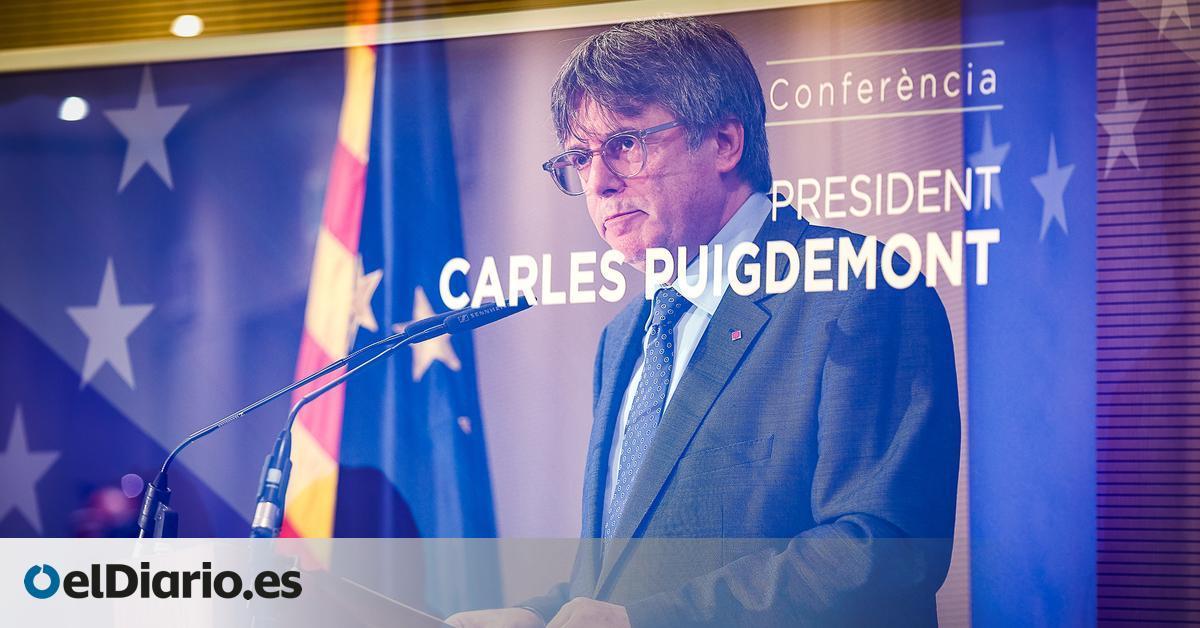
The Supreme Court has decided to open a case for terrorism against Carles Puigdemont and Rubén Wagensberg within the framework of the Tsunami Democràtic case, as requested by Judge Manuel García Castellón. The former Catalan president, affirms the Criminal Chamber, enjoyed “absolute leadership” over the massive protests of 2019 against the sentence of the process, a movement that he understands can be considered a crime of terrorism. “It is necessary and pertinent that they be called to the procedure,” says the Supreme Court before leaving the case in the hands of Judge Susana Polo, one of the few who has not had a relationship to date with causes of the Catalan process.
The Supreme Court judges align themselves with García Castellón and also with the Supreme Court prosecutors who requested Puigdemont’s indictment for terrorism. The former Catalan president, they say in his car, had “absolute leadership” and “intellectual authorship” of everything that the Tsunami Democràtic platform was doing, among other things leading massive protests and riots in the streets of Barcelona and at the Barcelona airport. El Prat to protest against the sentence that convicted the leaders of the process of sedition, embezzlement and disobedience.
Among the indications, the judges do not mention the tourist who died in El Prat, the cornerstone of García Castellón’s accusation, but they do mention that the Tsunami protests were, precisely, against the sentence that convicted members of his Government. They review messages from his collaborator, Josep Lluís Alay, with members and promoters of Tsunami in which they urged to “transfer” doubts to Puigdemont, among other things. Also that he was at a meeting in Geneva in 2019 and that, on the day of the public launch of the platform, both he and other defendants showed their support through their Twitter accounts.
The Supreme Court understands that multiple crimes were committed: illegal detention at the El Prat airport, possible injuries and attacks against authority due to street riots, “massive” falsifications of plane tickets to collapse the airport and “serious property damage” in the streets of Barcelona. But also possible street terrorism. “There should be no doubt that the facts described in the reasoned exposition could be included in the current art. 573.1”, article of the Penal Code that defines terrorism. “Low intensity” terrorism.
The Supreme Court even justifies that not only ETA or jihadism are susceptible to being considered terrorists. “The statement that emerges in some politicians and the media that only the actions of ETA or Jihad deserve to be treated as terrorism is incompatible,” says the Manuel Marchena Chamber. And he reviews several sentences related to ETA and kale borroka in Donosti and Santutxu to justify it. He also remembers that, just four years ago, the Prosecutor’s Office itself included the violent factions of the independence movement in the terrorism heading of its annual report.
Regarding Puigdemont’s role, they highlight that it is not necessary to be in the front row to be considered an active member of terrorist acts. “The men in the back,” he says, speculating about the role of the former president, can also be “immediate perpetrators” of the crime of terrorism carried out by others. “From the beginning Puigdemont was informed of the constitution of the organized group,” say the judges. “He appears directly involved in the launch of the Tsunami campaign,” he adds. He was able to “avoid” the altercations, “withdrawing his charismatic support,” says the Supreme Court, “but far from that he encouraged them to continue the violent actions that were developed with his knowledge and consent.”
Prosecutor’s Office: they are “mere conjectures”
The case reached the Supreme Court after the judge of the National Court, Manuel García Castellón, decided to promote the Tsunami case in parallel to the negotiations between PSOE and Junts to invest Pedro Sánchez and carry out the amnesty law. The investigation into the 2019 mass gatherings organized by Tsunami Democràtic to protest against the procés ruling focused on a possible accusation of terrorism surrounding the death of a tourist during the blockade of El Prat airport. The judge then decided to send a reasoned statement to the Supreme Court against Carles Puigdemont.
The first stop for that accusation was the Prosecutor’s Office. After the Public Ministry of the National Court had openly positioned itself against charging Puigdemont, the debate moved to the board of criminal prosecutors of the Supreme Court. A majority of its members rejected the presentation of prosecutor Álvaro Redondo and opted to request the indictment of Puigdemont for terrorism, although the division of chief prosecutors left the final decision in the hands of the lieutenant prosecutor, the head of the Public Ministry in the Supreme Court. Her ruling was the opposite: reject the accusations of terrorism against the former Catalan president.
The writing of the prosecutor María Ángeles Sánchez Conde was forceful against the criteria of Judge García Castellón. She accused the instructor of requesting Puigdemont’s indictment based on “mere conjectures or suspicions” when “there is no evidence” against the former president. She did not rule out the existence of other types of crimes in those altercations, speaking of “very serious incidents” and clashes with the Police of “important seriousness”, but she urged that the National Court continue investigating, although not against the leader of Junts.
The Supreme Court radically disagrees with Sánchez Conde’s opinion and cites passages from the prosecutors’ report that supported the accusation of terrorism. He reproaches the lieutenant prosecutor of the Supreme Court for having made a “subjective” and isolated interpretation of the different facts attributed to Puigdemont. “It is not acceptable to analyze each of those elements and give them another interpretation, or to isolate them from the body of evidence by drawing their own conclusions,” the order states.
Switzerland’s refusal
The development of this accusation of terrorism against the political leaders of the process in the Tsunami case has also been analyzed by the authorities of Switzerland, the country where another of those accused by García Castellón has been located since 2018: Marta Rovira. The magistrate asked the Swiss authorities to locate the ERC leader and also provide information about her banking movements between 2019 and 2020, but the response from Bern was not what he expected.
As happened with a previous request, the Swiss authorities refused to provide Rovira’s location and expressed their doubts that García Castellón’s investigation had any type of political overtone against Rovira. They also requested information about the possible amnesty law and how it could affect the Tsunami case. The response of the Spanish judge, who went so far as to accuse Switzerland of acting in this case under political criteria, was to provide the opinion of the Supreme Court prosecutors who did support his theory of terrorism, a document with internal value for the Prosecutor’s Office but without procedural value. .
The reasoned statement was directed not only against Wagensberg and Puigdemont, but also against others involved in the case. The Supreme Court only declares itself competent to investigate the first two, currently outside Spain, and refuses to open a case against Marta Rovira or Josep Lluís Alay.
Source: www.eldiario.es

